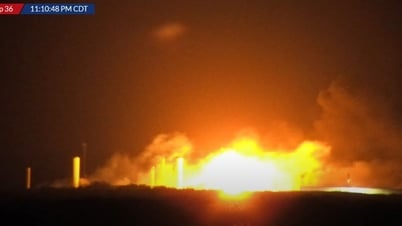Since humans began exploring space more than 60 years ago, 20 people have died in the line of duty. Fourteen of those were in the two NASA space shuttle disasters of 1986 and 2003. The other three were Soviet cosmonauts who died on the Soyuz 11 mission in 1971. The remaining three were astronauts who died in the Apollo 1 launch pad fire in 1967.
Given the complexity of manned space missions, the number of fatalities is actually quite low. However, NASA is preparing to send humans to the Moon by 2025 and plans to send humans to Mars in the next decade.
Commercial space flights are also becoming more common. And as space travel becomes more frequent, the possibility of people dying in the process is becoming a reality we have to face.
So a dark but necessary question arises: If someone dies in space – what happens to the body?
Die on the Moon or Mars
As an expert in how to protect astronaut health – Dr. Emmanuel Urquieta and his team at the Translational Research Institute for Space Health have focused on finding ways to keep astronauts in the best health possible for missions beyond Earth.
According to him, currently, if someone dies while performing a mission in low Earth orbit – for example on the International Space Station (ISS) – the crew can bring the body back to the ground within a few hours, thanks to a spacecraft.
If death occurs on the Moon, it would only take a few days to bring the body back to Earth. NASA has specific procedures for handling this situation.
Because the time it takes to get the body back is so quick, preserving the body is not the biggest concern. Instead, the top priority is ensuring the safety and return of the surviving family members.
However, if an astronaut dies on a flight hundreds of millions of kilometers to Mars, it will be completely different.
In that situation, the crew would be unlikely to return mid-flight . Instead, the body would be retained and returned with the crew after the mission was completed – which could be several years after the death occurred.
During that time, the body could be stored in a separate compartment or a specialized bag. The stable temperature and humidity inside the spacecraft could help preserve the body.
But this scenario only applies if death occurs in a pressurized environment – such as on a space station or spacecraft.
Death in space
So what would happen if a person stepped into space without wearing a spacesuit?
The answer, according to Dr. Emmanuel Urquieta, is that the person would die almost instantly. The sudden drop in pressure and exposure to a vacuum would leave them unable to breathe. Additionally, their blood and other bodily fluids would boil due to the zero pressure.
So what would happen if an astronaut stepped onto the surface of the Moon or Mars without protective gear?
The Moon has virtually no atmosphere today – in fact, it has only a very thin layer of gas. Mars, on the other hand, has a much thinner atmosphere than Earth, and almost no oxygen. So in both cases, a person without a spacesuit would meet the same fate as if they were in space: instant death from suffocation and boiling blood.
Suppose an astronaut dies after landing and working on the surface of Mars, how will the body be handled?
According to Emmanuel Urquieta, cremation is not feasible because it consumes too much energy, while resources on Mars are very limited. Burial is also not a good option because bacteria and organisms in the body can contaminate the surface of the planet.
Instead, the remaining members can preserve the body in a specialized bag until it can be brought back to Earth.
There are still many unknowns about how humans will deal with death in space. The problem is not just the disposal of bodies.
Equally important is helping surviving family members cope with the loss, and supporting the family of the deceased on Earth. Psychological, emotional, and ethical factors also play a large role in coping with death.
But to actually colonize other worlds – from the Moon to Mars to planets beyond – these grim scenarios need to be prepared for and planned for now./.
(Vietnam+)
Source: https://www.vietnamplus.vn/chuyen-gi-se-xay-ra-neu-mot-nguoi-thiet-mang-ngoai-khong-giant-post1043269.vnp





































































































Comment (0)